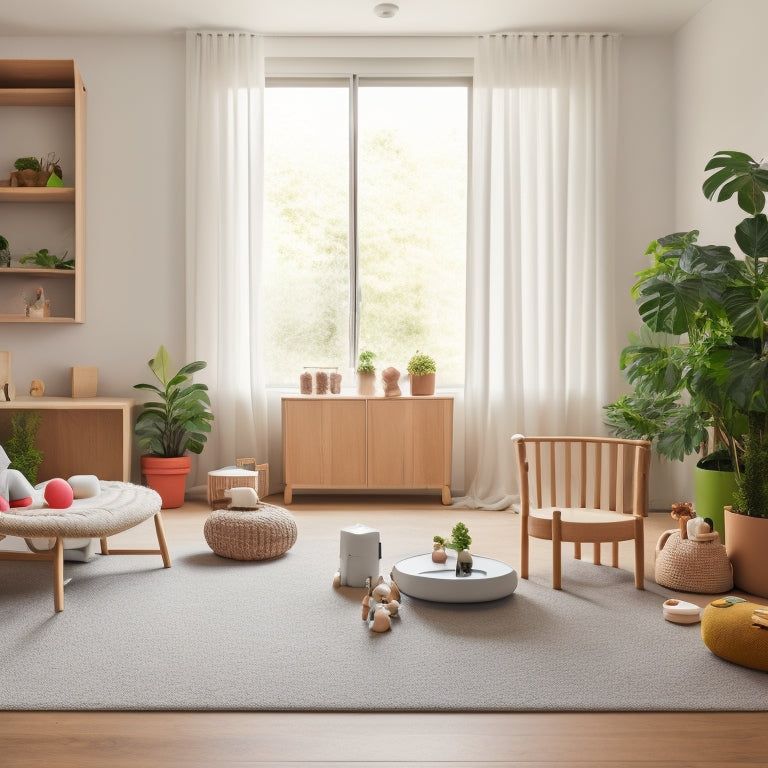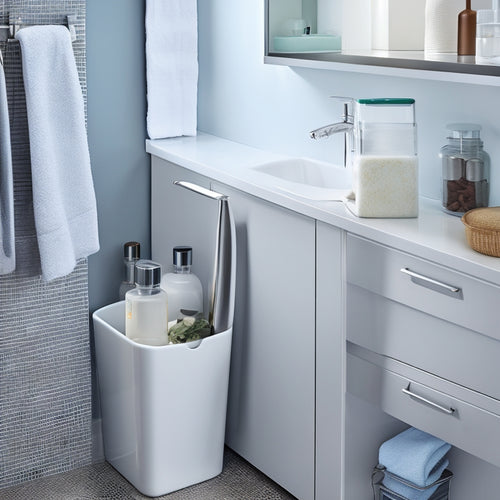
Revolutionizing Home Learning: Montessori Mastery Unleashed
Share
As we begin this journey to revolutionize home learning, we comprehend that igniting Montessori mastery requires a deliberate and multifaceted approach. We're discussing nurturing emotional well-being through connection, self-care, and mindfulness, and fostering practical life skills like independence and responsibility. By establishing daily rhythms and optimizing learning spaces, we can reveal the full benefits of Montessori education, including confidence, curiosity, and compassion. By mastering the essentials and creating a supportive environment, we can empower our children to take ownership of their education and thrive. And that's just the beginning – there's so much more to explore.
Key Takeaways
• Nurturing emotional well-being through connection, self-care, and mindfulness lays a foundation for lifelong learning and confident navigation of challenges.
• Mastering practical life skills, such as self-care and problem-solving, fosters independence, responsibility, and confidence in daily routines.
• Establishing daily rhythms and prioritizing independence in routines promotes security, focus, and a sense of ownership among children.
• Unlocking Montessori benefits through hands-on experiences and self-directed learning cultivates emotional intelligence, social skills, and respect.
• Optimizing learning spaces through efficient storage, flexible layouts, and natural light enhances mood, productivity, and exploration, inspiring a love of learning.
Nurturing Emotional Well-being
As we begin our Montessori homeschooling journey, we recognize that connection, self-care, movement, breath work, gratitude, and mindfulness are essential for fostering emotional well-being and creating a strong foundation for learning.
We prioritize building emotional connections with our children, creating a safe space for them to express themselves freely. Mindfulness practices, such as deep breathing exercises and guided meditations, help our children develop self-awareness and regulate their emotions.
By incorporating these practices into our daily routine, we empower our children to navigate challenges with confidence and resilience. As we nurture their emotional well-being, we lay the groundwork for a lifelong love of learning and a strong foundation for future success.
Practical Life Skills Mastery
We extend our nurturing approach to practical life skills, where daily tasks become opportunities for our children to develop independence, self-confidence, and a sense of responsibility for themselves and others.
We believe that practical life skills are essential for our children's growth, and we make them a priority in our homeschooling journey. Through skill-building activities, our children learn to take care of themselves, their environment, and others.
They develop fine motor skills, problem-solving abilities, and critical thinking, all while building their confidence and self-esteem. By incorporating practical life skills into our daily routines, we empower our children to become capable, independent, and compassionate individuals.
Establishing Daily Rhythms
By intentionally establishing daily rhythms, we create a sense of security and predictability that allows our children to thrive in their Montessori homeschooling environment. This structure helps our kids feel safe and confident, enabling them to focus on learning and exploration.
We build routines that prioritize independence, allowing our children to take ownership of their daily tasks and activities.
By establishing a consistent morning rhythm, we set the tone for a productive day.
We incorporate quiet time routines that cater to our child's age and needs, promoting relaxation and focus.
Unlocking Montessori Benefits
Embracing the Montessori method reveals a treasure trove of benefits that extend far beyond the classroom, fostering a lifelong love of learning and empowering our children to become confident, curious, and compassionate individuals.
As we explore this approach, we're tapping into our children's potential, allowing them to grow into capable and independent learners.
By fostering growth through hands-on experiences, self-directed learning, and practical life skills, we're giving them the tools they need to thrive in an ever-changing world.
We're not just teaching academics; we're cultivating emotional intelligence, social skills, and a deep respect for themselves, others, and the environment.
Optimizing Learning Spaces
Designing our learning spaces with intention and creativity allows us to maximize our children's potential, fostering independence, focus, and a deeper connection to the Montessori method. By thoughtfully organizing our spaces, we create an environment that encourages exploration, creativity, and self-directed learning.
Here are some ways we optimize our learning spaces:
-
Efficient storage: Utilizing shelves, baskets, and trays to keep materials within reach, yet out of sight, promotes a sense of calm and focus.
-
Flexible layouts: Creating adaptable spaces that can be rearranged to accommodate different activities and learning styles keeps our children engaged.
-
Natural light: Positioning learning areas near windows or using full-spectrum light bulbs enhances mood and productivity.
- Cozy reading nooks: Designating quiet, comfortable areas for reading and reflection inspires a love of literature and learning.
Fostering Independence Naturally
We often find that fostering independence naturally begins with creating an environment where our children feel trusted and supported to take ownership of their learning journey. By giving them the freedom to explore and discover, we're empowering them to become active participants in their own education.
This approach allows them to develop a sense of autonomy, which is essential for their independence journey. As they navigate through their natural learning process, they'll begin to recognize their strengths and weaknesses, and take ownership of their progress. By doing so, we're not only promoting independence but also building confidence and self-motivation.
As they grow and learn, they'll become more self-sufficient and better equipped to tackle challenges on their own, ultimately leading to a more fulfilling and successful learning experience.
Mastering Montessori Essentials
As we explore the world of Montessori education, mastering its essentials becomes important to creating a supportive environment that fosters independence, self-directed learning, and a deeper understanding of the curriculum.
To achieve this, we focus on key areas that promote a seamless learning experience.
-
We prioritize parent involvement, recognizing that our active role in the learning process is vital to our child's success.
-
We explore the Montessori curriculum, understanding its structure and sequence to provide a thorough education.
-
We create a prepared environment that encourages exploration, experimentation, and discovery.
- We model the behaviors and values we want our children to adopt, such as respect, empathy, and self-motivation, to foster a strong sense of community and social responsibility.
Frequently Asked Questions
How Do I Handle Tantrums and Meltdowns in a Montessori Homeschool Setting?
We handle tantrums and meltdowns by prioritizing emotional regulation, creating a calm environment, and teaching self-soothing skills, ensuring our homeschool space remains a safe haven for our children to learn and grow.
Can I Adapt Montessori Methods for Children With Special Needs or Disabilities?
Like a master chef seasoning a dish, we tailor Montessori methods to meet individual needs, incorporating inclusive materials and adaptive assessments to guarantee every child, regardless of abilities, can savor the flavor of learning and thrive.
How Do I Balance Montessori Principles With State or National Curriculum Requirements?
'We balance Montessori principles with state or national curriculum requirements by aligning our lessons with curriculum standards, incorporating standardized testing, and creatively adapting materials to guarantee compliance while preserving the Montessori spirit.'
What Are Some Montessori-Friendly Ways to Manage Screen Time for Children?
We establish digital boundaries by setting screen-free zones and times, offering screen alternatives like puzzles and art, and modeling responsible tech use to promote a healthy balance between technology and Montessori principles.
How Can I Involve My Montessori-Homeschooled Child in Community Service Activities?
We involve our Montessori-homeschooled child in community service activities by exploring volunteer opportunities that foster social awareness, teaching empathy and responsibility, and encouraging them to take an active role in making a positive impact.
Related Posts
-

Boost Productivity With Free Google Sheets Templates
You can enhance your productivity exponentially by utilizing free Google Sheets templates, which offer a proven way t...
-

Revamp Your Under-Sink Setup Like a Pro
To revamp your under-sink setup like a pro, start by evaluating your space and categorizing existing items, taking no...

